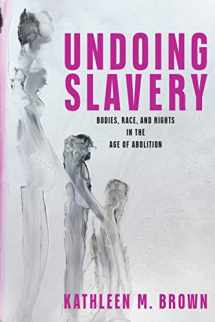
Undoing Slavery: Bodies, Race, and Rights in the Age of Abolition (Early American Studies)
Book details
Summary
Description
Review
"Undoing Slavery offers a powerful, sophisticated, and timely re-examination of the American antislavery struggle that focuses on the central importance of both bodily emancipation and embodied freedom. Brimming with insights on gender, medicine, race, rights, and the ultimate meaning of human liberation, Kathleen M. Brown’s book is one of the most innovative treatments of abolitionism in years. Yet it also provides lessons for our own time, when new generations of scholars and citizens look to the past to better understand the fundamental link between human rights and bodily freedom. Simply a must-read book by one of our most creative and thought-provoking historians." ― Richard Newman, author of Freedom’s Prophet: Bishop Richard Allen, the AME Church, and the Black Founding Fathers
"Undoing Slavery will undo what you thought you knew about abolitionist campaigns. Combining a dazzling array of primary sources with insights gleaned from legal, medical, and gender studies, Kathleen M. Brown brilliantly upends the seemingly incontrovertible argument that abolition resulted from a discourse empowered by the Enlightenment and instead shows how concerns about the corporeal body framed the ways in which abolitionists developed their arguments to end slavery and led them to insist on bodily care as the urgent rationale for abolition. This is a truly original account of the people we all thought we knew and the conversations we all thought they had." ― Jim Downs, author of Maladies of Empire: How Colonialism, Slavery, and War Transformed Medicine
"Undoing Slavery arrives at the perfect moment for all who need to understand what’s at stake in the current battles over reproductive rights. An expert on law, race, gender, and sexuality in early America, Kathleen M. Brown shows how antislavery activists, especially Black women abolitionists, put bodies at the center of the fight to undo slavery. Ultimately, ending slavery was as much about Black women reclaiming control over their bodies and their reproductive freedom as it was about electoral politics or human rights discourse. Deftly moving among medicine, law, religion, and economics, Brown delivers a brilliant, necessary history for our time." ― Ariela Gross, author of Becoming Free, Becoming Black: Race, Freedom, and Law in Cuba, Virginia, and Louisiana
Undoing Slavery excavates cultural, political, medical, and legal history to understand the abolitionist focus on the body on its own terms. Motivated by their conviction that the physical form of the human body was universal and faced with the growing racism of eighteenth- and nineteenth-century science, abolitionists in North America and Britain focused on undoing slavery’s harm to the bodies of the enslaved. Their pragmatic focus on restoring the bodily integrity and wellbeing of enslaved people threw up many unexpected challenges. This book explores those challenges.
Slavery exploited the bodies of men and women differently: enslaved women needed to be acknowledged as mothers rather than as reproducers of slave property, and enslaved men needed to claim full adult personhood without triggering white fears about their access to male privilege. Slavery’s undoing became more fraught by the 1850s, moreover, as federal Fugitive Slave Law and racist medicine converged. The reach of the federal government across the borders of free states and theories about innate racial difference collapsed the distinctions between enslaved and emancipated people of African descent, making militant action necessary.
Escaping to so-called “free” jurisdictions, refugees from slavery demonstrated that a person could leave the life of slavery behind. But leaving behind the enslaved body, the fleshy archive of trauma and injury, proved impossible. Bodies damaged by slavery needed urgent physical care as well as access to medical knowledge untainted by racist science. As the campaign to end slavery revealed, legal rights alone


We would LOVE it if you could help us and other readers by reviewing the book
Book review



